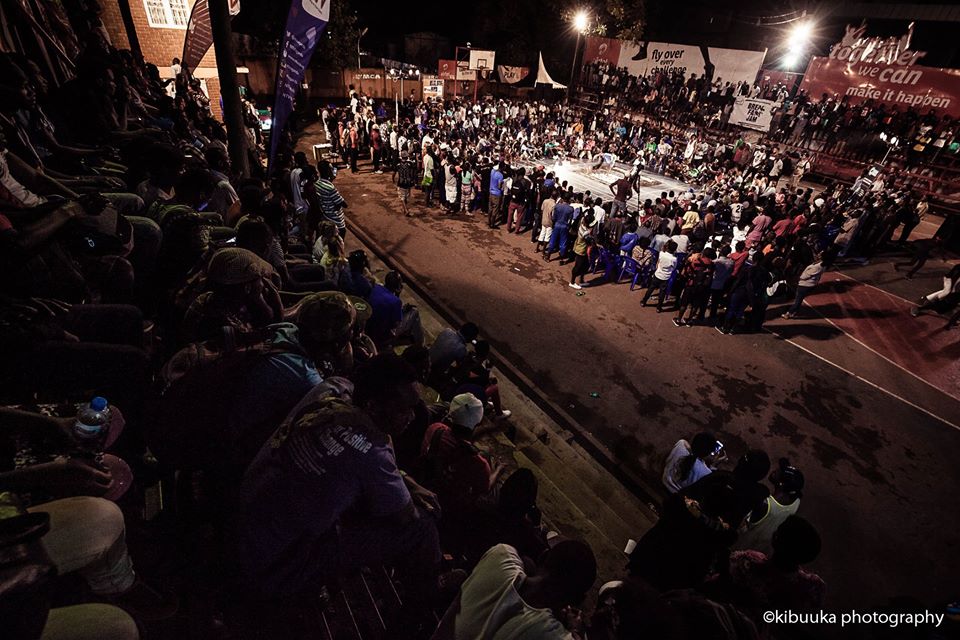When we started this event, from day one we said that this event is not ours. This event belongs to the people, it’s for our communities and everybody. I think it’s also that sense of community that gave people such a strong reason to love it. When we gave it to the people, they then felt free with us, like this event impacted everybody so they could also make an impact.
– Joram Ssekitoleko, official MC/founding member of Break-Fast Jam
It all begun from a modest yet exhilarating idea of a small group of Ugandan bboys in their early twenties. Brought together by the powerful work of Breakdance Project Uganda (BPU) and sharing the passion for hip hop, but with next to no experience of funding, managing or promoting big events, Joram Ssekitoleko, Oscar Kibuuka, Mark Kaweesi, Felix Lutakome and Taye Mugizi-Atayebwa decided to take a step and provide a platform for the aspiring group of bboys birthed by BPU, to settle their competitive attitudes on the battle field. “Back in the day so many different organizations and groups started beefing with each other”, Ssekitoleko explains and continues, “saying how this community is better than this community, so we thought why don’t we start up something really competitive, so that instead of these organizations beefing it among themselves, they’ll just come battle it out. So we came up with Break-Fast Jam.” The five bboys shared a vision and felt like they owned their passion, everything else could be learned later. As Kibuuka, a 24 year old self-taught photographer, also acting as the official photographer of Break-Fast Jam, puts it: “If there is a need for a change in our community and you can see it, however small it is, you just need to take a step. And if you succeed… I mean look at what we have now, from the very, very scratch we now have an event, made from having 2–3 dollars, to what it is today, where we’ve even had a sponsorship to bring Crazy Legs himself on board.” He further adds how they were lucky to be challenged without looking for it themselves. As Break-Fast Jam has been organically growing from a sharing circle in the backyard into an annual breakdance event unparalleled to anything else within East Africa, with sponsoring and impressive media coverage, it so happened that the team had to learn to think about and manage finances to respond to more needs, with an actual team where people have different aspects they work on. Along the years Break-Fast has been lucky to enjoy the input of various community builders, from various Ugandan communities, but in its current form is run by the core team of Ssekitoleko, Kibuuka and the chairman Kaweesi.
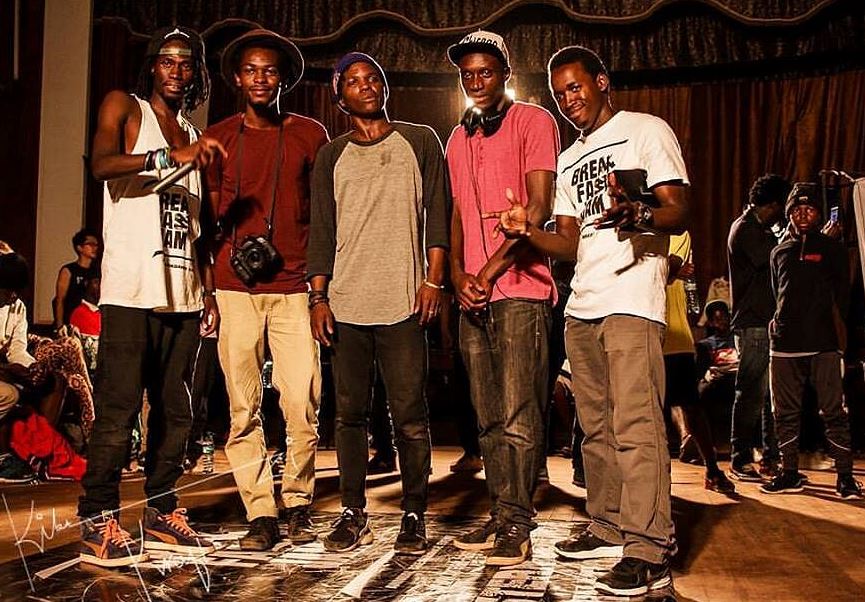
Ssekitoleko Joram, Kibuuka Oscar, Egesa ‘Fullmoon’ Eric, Kirumira Issa and Kaweesi Mark — some of the faces behind the annual event.
“In 2011 we started organizing eliminations, but by that time we were so few, and we only had them in Kampala, places like Nateete, Kawempe, Mulago… Places that were near us, since all the time we were using our own money, so we only went to places we could afford to and places we knew had breakers.” As the concept of 7 to smoke battle was adopted as the key crowning battle, the next thing to do was to figure out how to find the top eight breakers from the whole of Uganda – thus the event started traveling to eight different communities hunting for their breaking kings. “In practice how it all happened was that many people had started paying attention to the event, so they approached us and requested us to come to them”, Kibuuka tells the story. In 2012, inspired by their Kenyan brother bboy Kamau, who “surprised us and came through to the finals after seeing our posts on social media”, the idea grew to take the event to Kenya, too. “In 2013 we expanded to Mbale, Jinja, Masaka, Luwero, so many districts within Uganda, then Kenya, and also started giving direct invitations to different dancers within our communities.”
As is most often the case with hip hop-led events, the issue that also Break Fast Jam keeps stomping on, is funding. It is important to note that Break Fast grew from its founders passion and love for hip hop, with the first ever event being funded through its organizers’ pocket money. “It has been both easy and difficult”, Ssekitoleko admits. “I will say that it has been mostly through friends that we are what we are now. When we didn’t have money and found ourselves stranded we would write to friends, asking to help us out with some money to be able to throw the final event. They always believed in the event and were seeing where it was going. We’ve even seen so many international hip hop artists and friends of friends coming through for this event. People we would never have expected to have visit us”. Kibuuka talks about how the group has many times come across sponsors, who end up not sharing the vision nor seeing the benefits for the coöperation, regardless of the fact that in their events “there’s always some company wanting to throw their banners out pretending like they’re on board”.
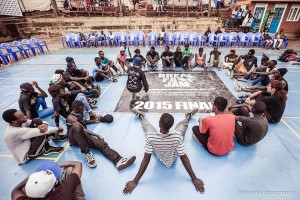
Bgirl Loca from Switzerland teaching a workshop during the 2015 finals.
At times the sponsors have gotten fascinated about what they are seeing, asking to get involved – only to then let the team down on the very last week. Struggling to find like-minded sponsors, Break Fast Jam has for years relied primarily on donations from individuals and organizations, while additionally having several Break-Fast Jam ambassadors on the field, promoting the event free of charge in their communities. Indeed, as Kibuuka highlights it, “what has built us are the people who believe and have always believed in the ideas and our vision, not only breakers but others who see this as a platform for youth empowerment, expression and for having fun.” To add to the mix, as a community hip hop event it has been possible to get many hip hop artists, DJs, rappers, graffiti artists and the likes to perform, paint and play music free of charge. “It’s actually funny”, Kibuuka laughs, “sometimes people from outside see the documentation coming out from the event and they get the idea that it’s some big, sponsored hip hop event and write to us with enthusiasm, like ‘yeah I would love to come through if you just pay for my flights and hotel. ‘ And we’re like, dude, you know the money for your flights, money for one flight is basically the budget for the entire event, so we can’t exactly facilitate you.”
While many big steps have already been taken since the initial one, many are still ahead, as the Break-Fast team dreams of reaching a status comparable to international bboy events such as Battle of the Year or Red Bull BC One. As Kibuuka and Ssekitoleko both agree in the course of our interview, a very essential driving force behind their work has been the desire to bring something African-made to the African continent, even in the hip hop world. As they were learning more about the worldwide breaking scene, it dawned on them, that although there are hotspots for African breaking in different parts of the continent, they lacked the local essence – while East Africa seemed to lack the hotspot all together. Ssekitoleko explains: “We see ourselves as the biggest East African breakdance event now, but we hope that maybe in few years’ time we will also have something even bigger locally, an African-manufactured event being recognized in Africa. There’d still be BC One, but also have Break-Fast Jam.” While aiming high, Kibuuka mentions smaller steps wished to be achieved on the way to the greater hights, one of these being featured in the annual international bboying calendar.
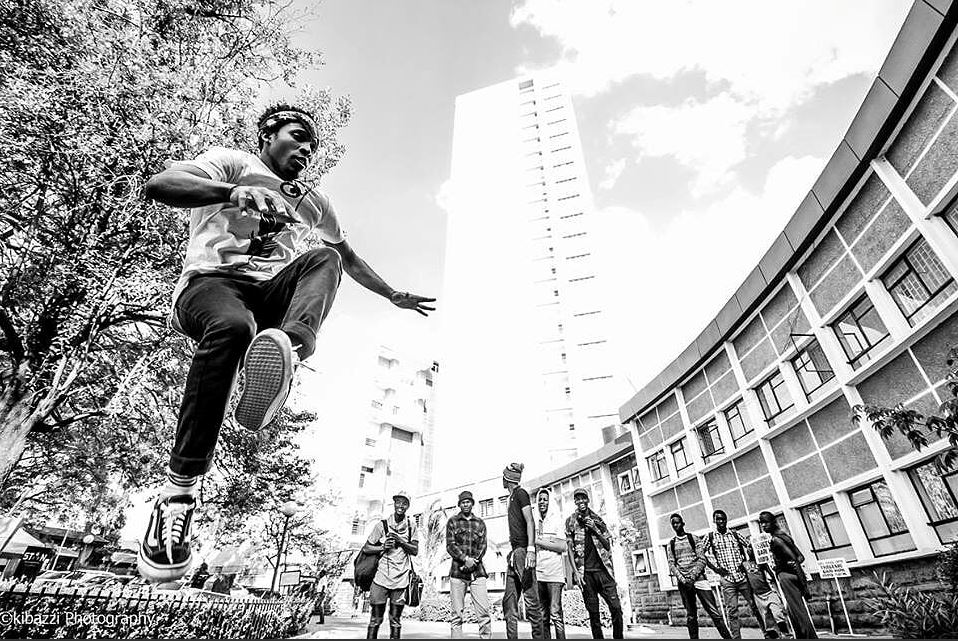
Fahadhi Kiryowa, three-time Seven 2 Smoke winner of Break Fast Jam, getting his groove on prior to the recent BFJ Kenya eliminations
Largely due to the influence and work started by the Ugandan hip hop pioneer Abramz Tekya as a ground breaking hip hop activist, the presence of breakdance and hip hop culture in Uganda has since its early years been rooted in and used as a tool for positive social change. It thus comes as no surprise, that most hip hop events in Uganda today carry the message of social empowerment, Break-Fast Jam being no different to this trend. “We’re looking at this as a platform for educating. Also in exploring how can hip hop and this platform be used to inspire people, dancers and others to improve themselves and their skills and through that further their goals and take them where they want to go. If a dancer from Mbale one day competes in BC One, we will see it as a collective success for the East African breaking community”, Kibuuka explains. It is one thing to keep encouraging a generation of bboys inspired to win Break-Fast Jam, but to grow the event into its full force, to compete with the likes of Red Bull BC One, you must also build the country’s reputation more in the hip hop scene way beyond Uganda. That is most certainly in the mind of Fahadhi Kiryowa, 23, a three time 7 to smoke Break-Fast Jam champion, member of Breakdance Project Uganda and a movie star from Shake the Dust, documentary that broke down boundaries and touched the hearts and minds of many hip hop heads globally. For Kiryowa, Break-Fast Jam has been a motivation boost, a battle that taught him to push more in order to reach more goals – and to never stop dreaming and working hard. “The first 7 to smoke I was in – I lost it. I felt like I need to step up my game. Every challenge for me, is an opportunity to step up more. When I’m battling, wherever it is, I don’t feel like I’m representing only Break Fast Jam or Shake the Dust or so on — I’m representing my own country, Uganda. So when I was training for the battles my focus wasn’t only in the battles here, it was to battle and to represent more, in BC One, IBE…” Kiryowa and his close friend and a fellow bboy from BPU, also one of the current organizers of Break-Fast Jam, Eric ‘Fullmoon’ Egesa, have already gotten a taste of what it would be like to showcase Ugandan breaking to the world beyond their home corners. “We were representing in Freestyle Session (LA, USA) in 2014, and it was really amazing, battling against Sup3r crew. All these famous bboys and bgirls were there, and I was thinking how this is really one of my dreams, to represent Uganda in other battles outside Uganda.” Having achieved all he could possibly hope to achieve competition-wise as a bboy in his home country, what is it that he would say to anyone aspiring to be the next Kiryowa of Uganda – or any other breaking community? “Sometimes they don’t see you perfecting your craft. One of the things you should think about – nothing. Don’t think about people judging you, maybe you lost your battle, well that’s that day, there’s another day. You can change it, just keep practicing. And keep feeling. Whenever you’re planning on making something, reaching somewhere, you always got to work hard for it. Know your weaknesses, and make it a bigger dream.”
Kiryowa’s words ring true to the many times proven real, yet consistently battled, potential of hip hop as a unique and a remarkably efficient tool to empower youths and make them see beyond their struggles. As much as Kiryowa’s mind has been in winning more battles and improving his craft, as a side effect he, among many other fellow dancers, has become a home grown Ugandan superstar and an object of admiration. By winning titles and scoring jobs as the backup dancer of some of Uganda’s most celebrated artists, he has been able to inspire a generation of bboys and bgirls alike in Uganda, to believe them, too, can achieve success, no matter what their background, level of education, or income. While Break-Fast Jam for the time being is unable to reward its champions with a thousand dollar cash prizes, Kibuuka highlights the importance the won titles play in the everyday lives of their receivers, harnessing the youth with more power and respect both at home and at school. “What we’re creating now is our own role models, heroes we can actually touch and reach and relate to. The event has created people who you can admire and yet meet in your day to day life and talk to, and get inspired from everything you can learn from them. We have our own superstars and champions, I think this has been one of those very powerful things that came to us along the process. It also pays a role in their personal lives and in their communities. For their families it’s showing something is coming out of all this when their kids are coming back home with a trophy. It shows them they’re not just fooling around.”
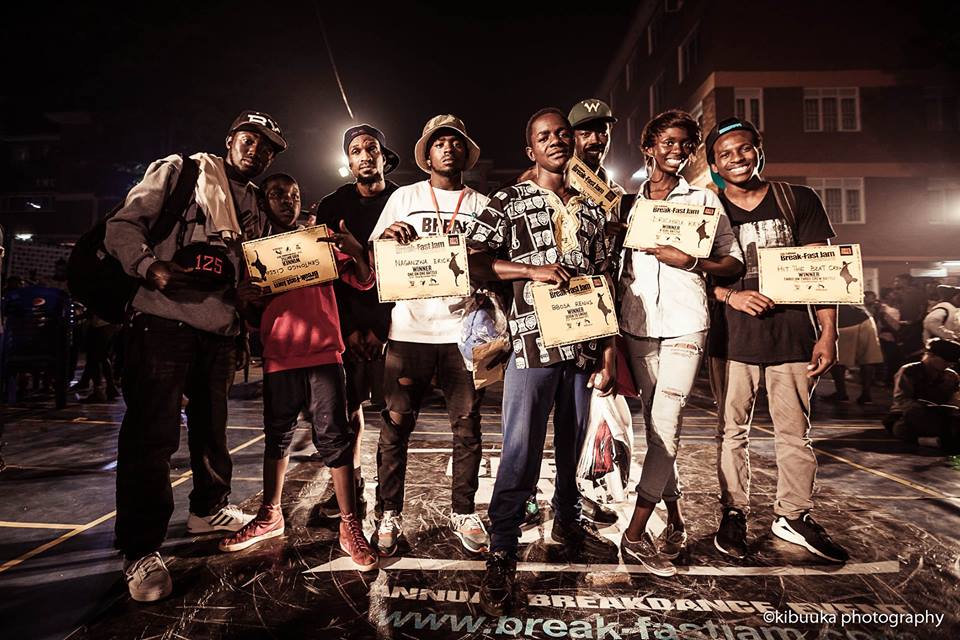
Hit the beat crew, bboy Bbosa, bboy Erick Sama, popper Uncle Walter, bgirl Key and bboy Cizza — all the 2015 BFJ Finals Champions.
On the other hand, Break-Fast Jam along other hip hop initiatives has been able to equip youth with skills and knowledge that has in return resulted in means of employment in several cases. As Kibuuka puts it, “Uganda, being a very young country, needs its youth to work on improving our current situation. With our rate of youth unemployment (evaluated as high as 75–85% depending on estimates) we have a lot of work to do on that area, but also a lot of power. Breakdancing is an unconventional practice that does not really belong to any particular entity of power, like the government, and is really explosive and attractive to the young people, also giving them a voice.” Indeed, Uganda’s unemployment rates are staggering, and with little support from the government and poor levels of education, many young Ugandans find themselves idle and without a focus, even hopeless. In such a setting, activating youth to change things for themselves, is more crucial than ever. Kibuuka continues, “I see through Break-Fast Jam we can get a lot of employment for the youth in many different aspects. You see a lot of youth that are into music engineering, sound production, graphic design, photography, but are lacking a platform to showcase this. With our platform there are also many opportunities to gain experience in their interests to then gain a living through that.”
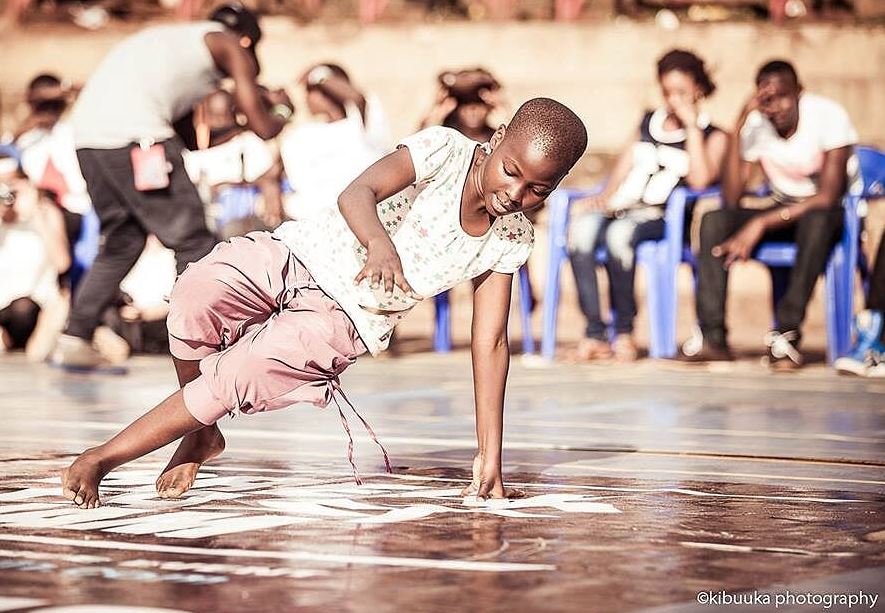
Bgirl Sharon from Breakdance Project Uganda, during the bgirl battles of the 2015 finals.
The talk of employment opportunities brings one outstanding individual to Ssekitoleko’s mind, Katabira Dennis, a Break-Fast Jam Champion from 2012. “Break-Fast Jam has been a tool for us to discover breakers. Dennis is a good example that we found to be a very good breaker in his community, and ever since then he didn’t stop practicing. He won the Break-Fast Jam 2012 and many other battles. Currently he’s living in Kenya and working as a dancer with his crew FBI dance crew. There are so many people in communities outside Kampala that have come to surface thanks to Break-Fast Jam that people have gotten to know about through our events.” Kibuuka continues to remind how the examples of positive role models and employment also include the members of the core team: “As a photographer I know I can count on these people, whenever I have an idea I want to work on I can reach out to these bboys, and I’ve gained a reputation as an action photographer. If someone needs dance photography they’ll have Oscar at the back of their mind. As far as it comes to hosting events you cannot imagine anyone better than Joram, he knows how to work the crowd and he’s spent years doing that now. It’s been like free schooling for us.” The official DJ of the event, Kirumira Issa, also a member of Breakdance Project Uganda, has become bigger in the wider DJ scene of Uganda also thanks to the platform granted to him through Break-Fast Jam. Another story of empowerment is the chairman Mark, who at the time of the interview was attending a program for Young African Leaders (YALI) in the Washington DC. “All of us have benefitted from this process”, Ssekitoleko closes.
Gratitude for the guidance of both Breakdance Project Uganda and its founder Abramz, in nurturing a generation of creative and active Ugandan youths to be change agents in their communities, is expressed several times in the course of the interview. Kibuuka explains how the support and lessons learned from BPU have been a lifeline in the work they are doing now as an independent entity: “We came to learn and see how much power we have. With our uneducated skills, being organizers with our own power, just having the passion we had and a few people believing in us, especially in BPU, that was our big source of knowledge and resources. Infusing our passion and power, we were able to spread it more.” Staying innovative and constantly keeping an eye open for more possibilities of improvement in their surroundings is another trait left as a legacy from years of working with BPU. Ssekitoleko reminds how they didn’t include a bgirl category in the battles initially, until one year “we felt like girls need an equal chance to showcase their skills. And currently it’s one of the most powerful battles that so many people want to watch. There’s people in Uganda who never thought girls could do this, only boys, and now when it’s there, the whole Uganda wants to come and see it for themselves. Now girls are also being respected for something they want to do, in their homes, schools, even in social media”. Similarly, kids’ battle was introduced after the team realized how many eager and talented children were part of the Ugandan breaking communities. You can certainly hear the inspiration gained from the BFJ battles in the words of two young BPU bgirls, Sharon, 10, and Sanuy, 13. As Sharon describes it, “in Break-Fast Jam I see all these people doing their moves and it makes me do better in the kids battle. When I see those moves I take them in my brain and I train a lot so I will also get it.” Sanuy further adds how many of the bgirls and bboys that she gets to see in Break-Fast Jam “do a lot of moves and are so much better”. However, the 13 year old community leader no longer shines away from such a challenge: “But even me I believe in myself, in one Break-Fast Jam I came second but I know if I go again in kids battle I will be the first, I will be the winner. A bgirl also can be the winner.”
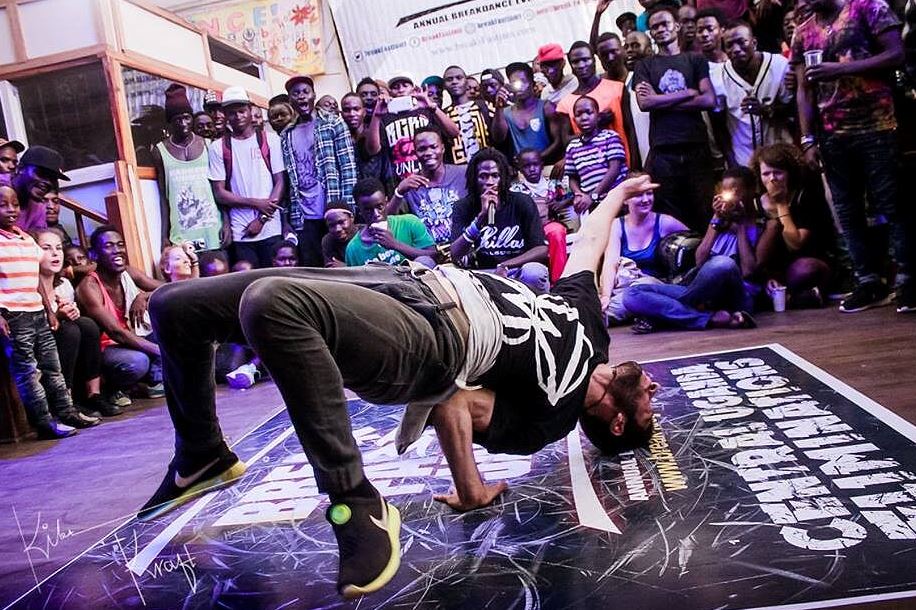
Abdul Hadi Naleh frm Jordan was showing what he got in his showcase battle against Ugandan bboy Bbosa, last year’s 7 to Smoke Champion.
Another step up that Break-Fast Jam is hoping to achieve in years to come, would be to find more exchange on an international scale, with not only foreign bboys coming to Uganda to share, but for Ugandans also to get more opportunities to go learn, teach and inspire outside Uganda. As Joram explains it, “exchange is there but not on the level we want it to be. Many international people have come here but on the other hand the local breakers haven’t gotten many opportunities to visit overseas in return. Reasons are often financial, air tickets are very expensive, but we hope as the event gets bigger we could see people learning more from each other’s cultures and knowledge.” Indeed, many international bboys and bgirls from around the world have made their way to Uganda to learn, share and get inspired by the East African breaking scene, including the legendary Rich ‘Crazy Legs’ Colon of Rock Steady Crew and Ryo Anijha from the Mighty Zulu Kings. After his second, and latest visit to Uganda, during the Break-Fast Jam finals in 2015, Crazy Legs made a Facebook post describing Ugandan breaking scene as one to “have changed the game and raised the bar”, in the true essence of the hip hop philosophy ‘making something out of nothing’. As he wrote, “of all the places in this world that I’ve been to, no one has taken hip hop and used it as a tool for social change, uplifting, education, peace, unity, love and having fun better than Breakdance Project Uganda. The world has a lot of catching up. If you have doubts about whether it’s possible or not, come to Uganda and see how all odds are faced and dealt with.” A Jordanian bboy, Abdul Hadi Naleh, visiting Uganda during August, to exchange with the local scene after meeting Eric Egesa and Fahadhi Kiryowa during their trip to the US, shares similar feels for Uganda: “I’ve been to many dance communities, like France, Turkey, United States, Norway, also in the Middle East, Dubai, Jordan, Lebanon, but seriously I have not seen a hip hop scene like the one in Uganda. It’s really based on sharing and there’s no distinguishing in between the kids and the elders. People are so respectful towards each other – it’s not about the level here, it’s just about the participation. Also it’s not only a breakdance community, but also a leadership and empowerment community.”
It is clear that Break-Fast Jam has already left an irreversible mark to the East African, if not the worldwide breaking scene. Working relentlessly for your own community is an art form that has gone lost on many international battle cats, who have gotten so involved in their own progress that they have forgotten to lead an example to the next generation and to contribute their share in guaranteeing the sustainability of the scene. Break-Fast Jam has despite its insecure funding been successful in striking a balance between staying true to your people and challenging bboys around the country to push for more and be better, in the name of, as Kibuuka put it, birthing their own national heroes. But what is the secret formula behind their success? Ssekitoleko quickly sums it up for me, “we never stepped back. We’ve always been passionate. At times we have to go the hard way, sometimes it’s the only way, but we’ve always agreed on keeping going. There are events that have begun similarly to this, friends coming together but as soon as they face a challenge they collapse. We’ve been misused and mistreated by so many Ugandan corporate companies more than once, but through that we’ve learned what to do and what not to do. Just trust and love what you’re doing and the people you’re doing it for.” Indeed, listening to the story of Break-Fast Jam I can’t help but think about the accuracy of the globally trending Instagram hashtag – hip hop, once again, wins. With the 2016 finals on the way on the 19th-20th November, let’s see who wins the battle.

Photography by Kibuuka Mukisa Oscar and Kibazzi Pius.
Follow @breakfastjam1 for updates!

